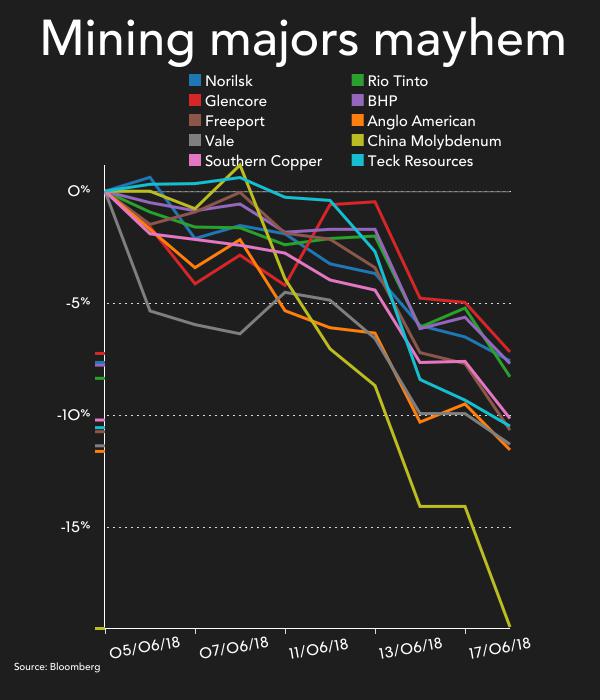US-China trade spat wipes $57B from top mining stocks in fortnight

 Mining and metals stocks came in for more punishment on Tuesday as the trade spat between the US and China escalated amid a war of words between Washington and Beijing.
Mining and metals stocks came in for more punishment on Tuesday as the trade spat between the US and China escalated amid a war of words between Washington and Beijing.
On Tuesday, Donald Trump threatened to impose a 10% tariff on $200 billion of Chinese goods in retaliation for what the US president called the country's "predatory" trade practices. Beijing also ratcheted up the rhetoric accusing the US of "extreme pressure and blackmailing".
Copper - used as barometer for economic prospects thanks to its widespread use in industry, transportation, power networks and construction - fell to $3.036 a pound or $6,700 a tonne, down over 8% or $600 since touching four-year highs just a fortnight ago.
Nickel, which has been immune to weakness in the sector also succumbed on Tuesday and is now trading 6% below multi-year highs hit earlier in June at $14,820 a tonne. Among industrial metals only nickel remains in positive territory for the year. Zinc down 8% year to date is the worst performer as the price declines to just above $3,000 a tonne.
Aluminum prices have given up all the gains from a sharp rise following the US imposition of sanctions on Russia and tariffs on imports from China, Europe, Canada and others.
China consumers more industrial metals and minerals than the rest of the world combined and the country imports more than two-thirds of the world's seaborne iron ore.
The import price of the steelmaking raw material declined 3% on Tuesday to $66.45 a tonne according to Metal Bulletin data. Iron ore has lost 9% of its value so far in 2018. The benchmark Australian export price of premium steelmaking coal at just below $200 a tonne is up year to date, but down sharply from levels above $250 hit in May.
Weakness on metal markets spilled over to the sector's big names with another day of across the board losses on Tuesday. The top diversified and industrial mining companies have seen a combined $57 billion wiped from their market value over the past two weeks (see chart). On a percentage basis China Molybdenum, Anglo American and Vale have fared worst.